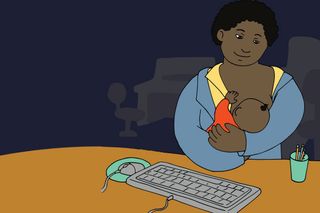
For New Mothers, Some Pediatricians’ Attitudes an Obstacle to Returning to Work
“Is it your baby or the office’s?” the doctor asked her.

When Mirnalini Venkatraman, 30, walked into a renowned and much-recommended pediatrician’s clinic when her son was 5 months old, she was looking for general guidance on pumping and storing breast milk, as she was nearing the end of her maternity leave. Instead, the pediatrician, upon hearing that she would be returning to work, asked “Can’t you stay at home until the baby completes a year?”
“Is it your baby or the office’s?” the start-up employee, based in Chennai, remembers the doctor asking, after she had assured him she had already started storing a stash of pumped breast milk in her freezer.
Mothers interviewed spoke of pediatricians addressing only them, when talking about crucial aspects of the child’s health, like immunization, even when the father was in the room with them. “The assumption is that the mother will be the primary caregiver and be the person on top of all things relating to the baby. It is also assumed that any side effect from vaccines will be handled by the mother who will be ‘staying’ at home to take care of the child,” says Priya Ravichandran, a policy researcher in Chennai and mother of two boys.
*
The assumption that the woman is the primary caregiver may not be wrong; like much of the world, India mandates no paternity leave, let alone equal parental leave, putting the burden of child care on women from giving birth.
“Globally, it is a norm that the mother is the primary caregiver,” says Dr. Arun Gupta, a Delhi-based veteran pediatrician and Central Coordinator of the Breastfeeding Promotion Network of India (BPNI). That said, he adds, “The needs of a mother must be prioritized alongside her child’s, and she should be treated sensitively by medical professionals.”
“I remember feeling terribly guilty, and felt like I was a horrible mother for going to work while my child was still dependent on me for milk.”
That sensitivity is lacking, say women interviewed. Instead, the message that often comes across is that the mother’s choice to work outside the home is compromising the child’s health and nutrition.
G., a marketing professional in Mumbai, who had taken a sabbatical after her maternity leave, returned to work when her daughter was 15 months old. Her daughter entered daycare and began falling sick. G., who prefers to be identified only by an initial, says the doctors she encountered during that time would remark, “‘If you send her to daycare, she will fall sick,’ ‘Why don’t you keep her at home?’ ‘Don’t you think she is too young to be spending the whole day at the daycare?’”
Read also: Four Women Talk About Returning to Work After Maternity Leave
For Venkatraman, her pediatrician’s questions were demoralizing, as she was looking for both expert advice as well as some encouragement before restarting work after six months of leave. Studies show confidence gaps among women returning to work after maternity leave — this 2018 study found fewer than 20% of women feel confident upon their return to work after having a baby.
“I remember feeling terribly guilty, and felt like I was a horrible mother for going to work while my child was still dependent on me for milk,” Venkatraman says. Returning to work had never been a question for either her or her family, until the pediatrician’s questioning. “I would tell folks who asked [about her plans], ‘I love my baby, but I can’t wait to go back to work!’ The ‘but’ is a reflection of the guilt, at least in part induced by various people’s attitudes — especially the pediatrician’s.”
*
While seldom explicitly stated, a child’s dependence on milk may be the sticking point, when it comes to pediatric concern over a mother’s return to work. Breast milk is associated with better health outcomes for babies, including lower risk of asthma, allergies, ear infections and diarrhea. While breast pumps and various other technology that aid expression and storage of breast milk have ensured any caregiver can feed a nursing baby, environments have yet to catch up. Elsewhere in the world, laws mandate employers provide nursing mothers a private space for expressing milk, but most workplaces and employers in India have yet to catch up. Amid an overwhelmingly male workforce, and a pervasive cultural belief that a mother’s place is in the home, many women are reluctant to ask employers for a space or the frequent breaks needed to express milk.
Read also: Can Indian Moms Breastfeed in Public Without Being Shamed?
Dr. Neeta Nathani, a Mumbai-based pediatrician running her own practice, and Dr. Armida Fernandez, who was the Head of Department of Pediatrics and Neonatology at Lokmanya Tilak Municipal General Hospital and who founded India’s first breast milk bank, both say that the onus is on the pediatrician to empower working mothers to return to the office – at whatever point the women choose.
“It is important to reassure those mothers who would like to continue breastfeeding after they go back to their workplace that it is possible to keep at it,” Dr Nathani says. Additionally, “I always emphasize that formula milk has been cleared by the FDA and is a perfectly legitimate choice to feed your baby with.”
If doctors can undermine new mothers’ confidence, they can also bolster it. Grace D’Souza, a Mumbai-based architect who attended one such workshop, says the support and information from a pediatrician cleared her doubts about returning to work after having her baby. “It also gave me the confidence to speak to any employer about giving me a private room to express milk every once in a few hours without feeling like I was asking for special favors,” she says.
That change in mindset might be what new parents, and society, really need from their pediatricians.
“Babies are resilient and will thrive even if the mother goes back to work, but a job may be the difference between financial security and penury for a family or be a ticket to professional success for the mother,” says Dr. Fernandez.
Hamsini Ravi is a writer and non-profit communications specialist. When not at work, she’s busy reading, traveling, cooking or playing with her three-year-old.
Related


Prime Minister Modi’s Meeting With Bollywood Has Taken ‘Manels’ to the Next Level
